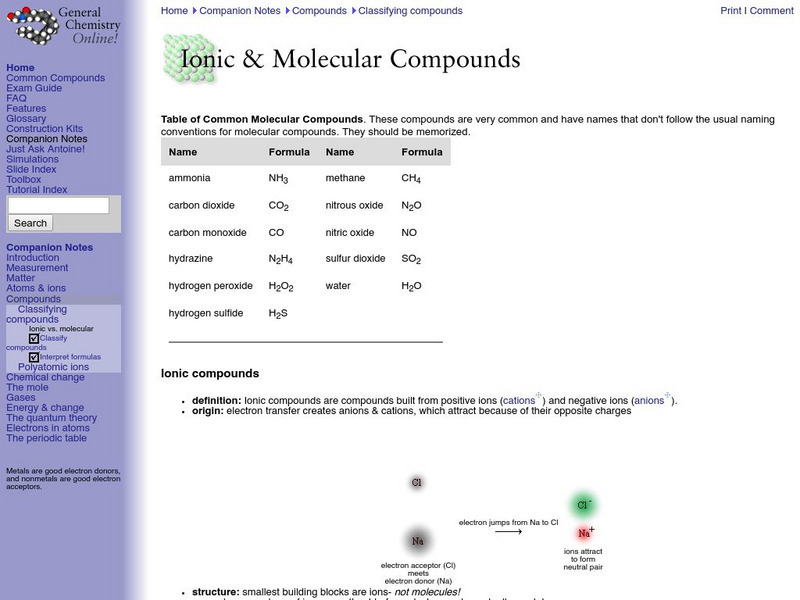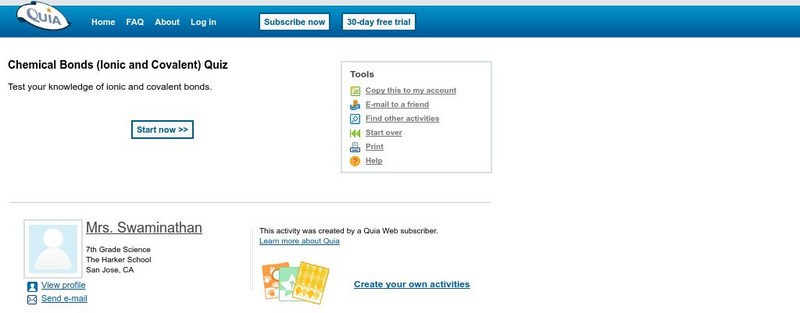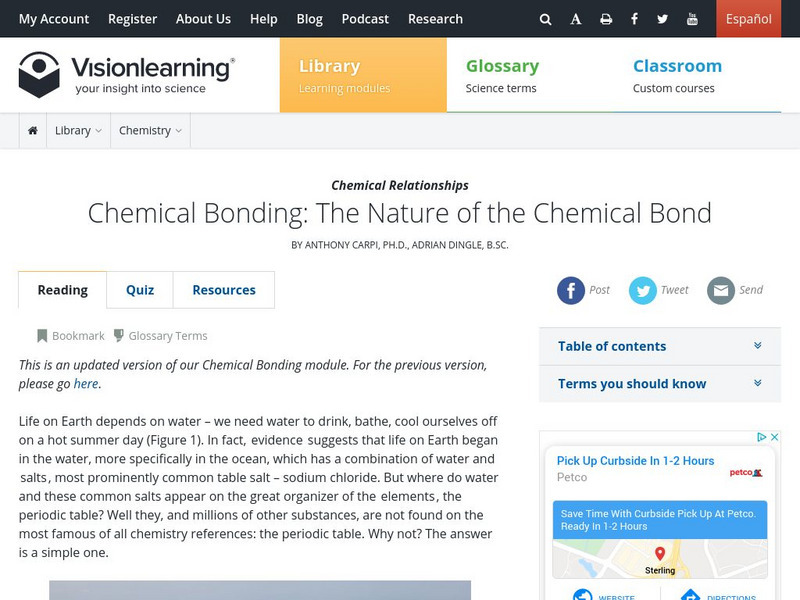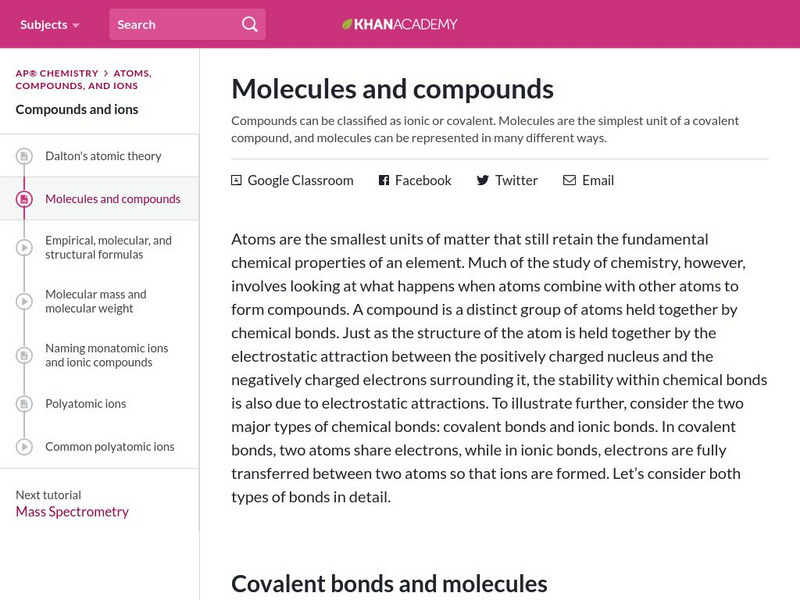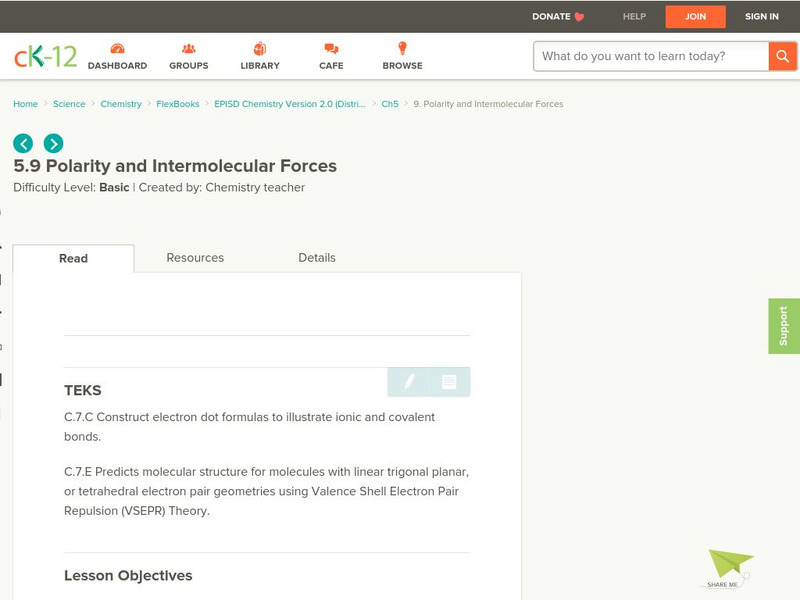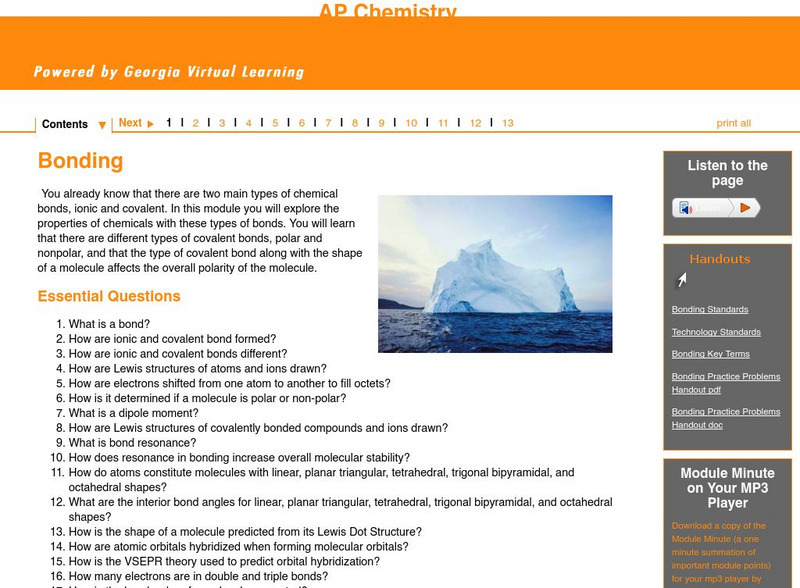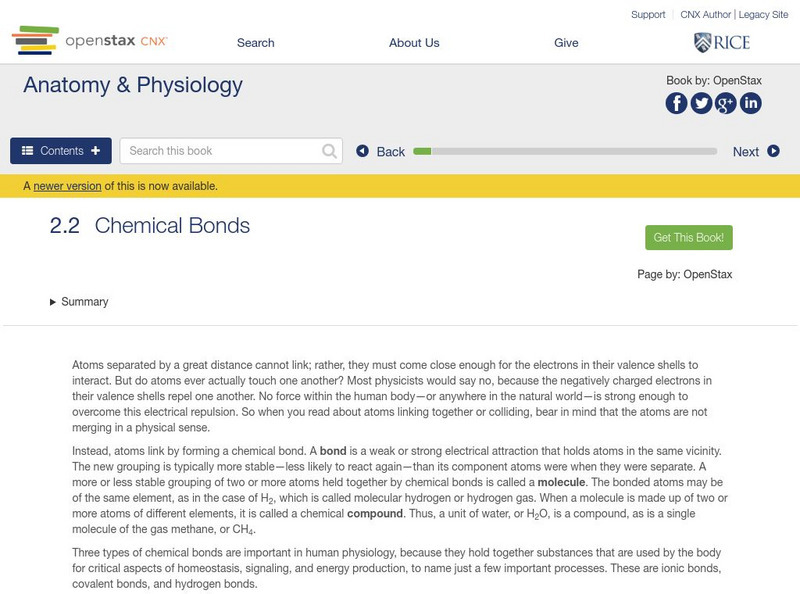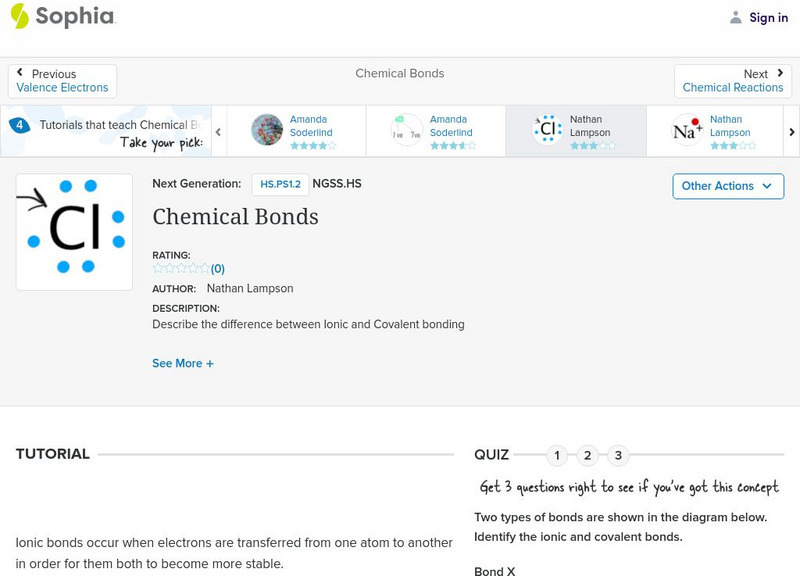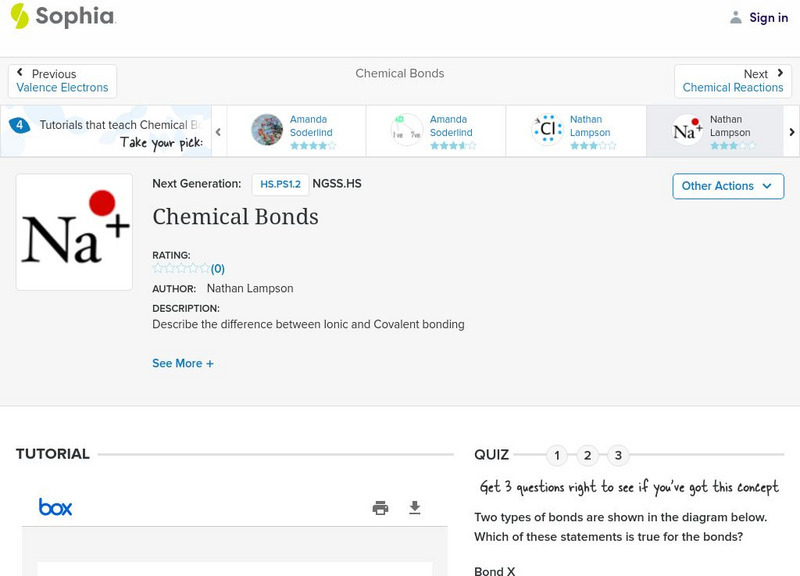Texas Education Agency
Texas Gateway: Ionic and Covalent Bonding
In this tutorial, students learn about ionic and covalent bonds and predict which elements will form which type of bond. Includes interactive exercises as well as videos.
Khan Academy
Khan Academy: Single and Multiple Covalent Bonds
Explains what covalent bonds are and the difference between them and ionic bonds. Discusses the properties of polar and non-polar covalent bonds, and single and multiple covalent bonds, and gives analogies and examples of how covalent...
Frostburg State University
General Chemistry Online: Ionic and Molecular Compounds
Provides a good outline of the concepts involved in ionic and covalent bonding, with links to definition of terms. Features a list of common molecular compounds and a chart that compares ionic and molecular compounds.
Quia
Quia: Chemical Bonds (Ionic and Covalent) Quiz
This is 21-question multiple choice quiz over chemical bonds was written for a 7th-grade science class.
Georgia Department of Education
Ga Virtual Learning: Physical Science: Bonding and Chemical Reactions
Through informational text, interactive puzzles, and review questions, students differentiate ionic and covalent bonds and identify the properties of each. They also use oxidation numbers to predict formulas of ionic compounds, name...
Chiral Publishing
Chiral Publishing: An Introduction to Chemistry: Compounds and Chemical Bonds: Audio Book
Did you ever wonder how or why atoms bond together? This interactive tutorial sheds some light on why bonds form and the difference between ionic and covalent bonds.
Vision Learning
Visionlearning: Chemistry: The Nature of the Chemical Bond
This site talks about ionic, polar covalent, and non-polar covalent bonding.
Concord Consortium
Concord Consortium: Stem Resources: Chemical Bonds
By working through this web-based activity, students differentiate between ionic, non-polar covalent, and polar covalent bonds. Specifically, distinctions are made between bonding types based on orbital shapes and electronegativity...
Khan Academy
Khan Academy: Molecules and Compounds
Article defines and explains compounds which are either ionic or covalent and molecules which are the simplest unit of a covalent compound. Molecules can be represented in many different ways.
Quia
Quia: Reading Detective: Main Idea
A 20 question quiz testing knowledge of ionic and covalent bonding.
Science Education Resource Center at Carleton College
Serc: Valence Electrons and Trends in the Periodic Table
This instructor led activity will produce a partially filled periodic table that contains electron-dot models for the first twenty elements in the appropriate boxes. It will be used as a visual tool for students to connect concepts such...
CK-12 Foundation
Ck 12: Polarity and Intermolecular Forces
[Free Registration/Login may be required to access all resource tools.] The following online tutorial describes how the electronegativity difference between two atoms in a covalent bond results in the formation of a nonpolar covalent,...
Utah Education Network
Uen: Conductivity and Bonding
Students will measure the conductivity of several compounds and solutions in order to predict the bond types (ionic or covalent) in the substances tested.
University of Florida
University of Florida: General Chemistry I: Chemical Bonding
Notes on covalent bonding, bond length, bond energies, Lewis dot structures, and percent ionic character. Colorful graphics.
University of Southern California
Atomic Bonds
This slide show on atomic bonds contains several slides on electron affinity. Other topics include covalent, Sigma and Pi bonds, and atomic bonding in solids.
Chem Tutor
Chem Tutor: Chemistry: Compounds
This lesson focuses on chemical compounds including Ionic and Covalent Bonds, Valences, Lewis Structures, Binary Covalent Compounds, Radicals or Polyatomic Ions, and much more. It also includes a compound worksheet in which the students...
ClassFlow
Class Flow: Ionic & Covalent Compounds
[Free Registration/Login Required] This flipchart presents rules for writing and naming ionic and covalent compounds. There is a short assessment using Activotes.
Georgia Department of Education
Ga Virtual Learning: Ap Chemistry: Bonding
In this module students explore the properties of chemicals with covalent and ionic bonds. Students learn that there are different types of covalent bonds, polar and nonpolar, and that the type of covalent bond along with the shape of a...
PBS
Pbs Learning Media: Chemical Bonds
This interactive activity developed for Teachers' Domain demonstrates how attractive forces between atoms create chemical bonds, resulting in the formation of molecules and compounds.
Other
All About Covalent Compounds!
Visit this site to find out what covalent compounds are, how covalent bonding is different from ionic bonding, how the properties of covalent compounds differ from ionic compounds, and how to name covalent compounds. There is also a link...
American Chemical Society
Middle School Chemistry: Energy Levels, Electrons, Ionic Bonding
Students discover that ionic bonding occurs when electrons are transferred from one atom to the other and not shared as in covalent bonding.
OpenStax
Open Stax: Chemical Bonds
Learn here about chemical bonds, a weak or strong electrical attraction that holds atoms in the same vicinity.
Sophia Learning
Sophia: Chemical Bonds: Lesson 2
Describe the difference between Ionic and Covalent bonding. This lesson is 2 of 5 in the series titled "Chemical Bonds."
Sophia Learning
Sophia: Chemical Bonds: Lesson 5
Describe the difference between Ionic and Covalent bonding. This lesson is 5 of 5 in the series titled "Chemical Bonds."


